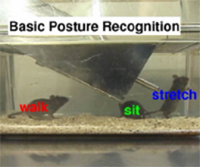Automated Monitoring of Animal Behavior in Medical Research |
||
|
 |
|
|
Belongie put together an interdisciplinary team to develop the hardware and software for automated, 24-hour-a-day monitoring and archiving of a continuous stream of measurements on animal behavior - rather than periodic observations by a lab technician. So far, Belongie has demonstrated the computer-vision and pattern-recognition software with data from a single cage, but the plan is to embark on a multi-million-dollar project that would allow researchers to develop and deploy the technology for two key areas - medical research, and emergency response (for so-called 'sentinel' cages at critical facilities). UCSD is a major
biological sciences research center, and animal-care specialists
believe the technology under development could dramatically
improve the care of research animals. The Smart Vivarium could
make better use of fewer lab animals and lead to more efficient
animal health care, while sick animals could be detected and
diagnosed sooner, allowing for earlier treatment. The technology
would also help to reduce the number of animals needed in scientific
investigations, because by recording all the data the first
time, scientists can go back and look for different patterns
in the data without using more mice to perform new versions
of the experiment. For many of the same reasons, the underlying
technology could be useful for the early diagnosis and monitoring
of sick animals in zoos, veterinary offices and agriculture. |
||
